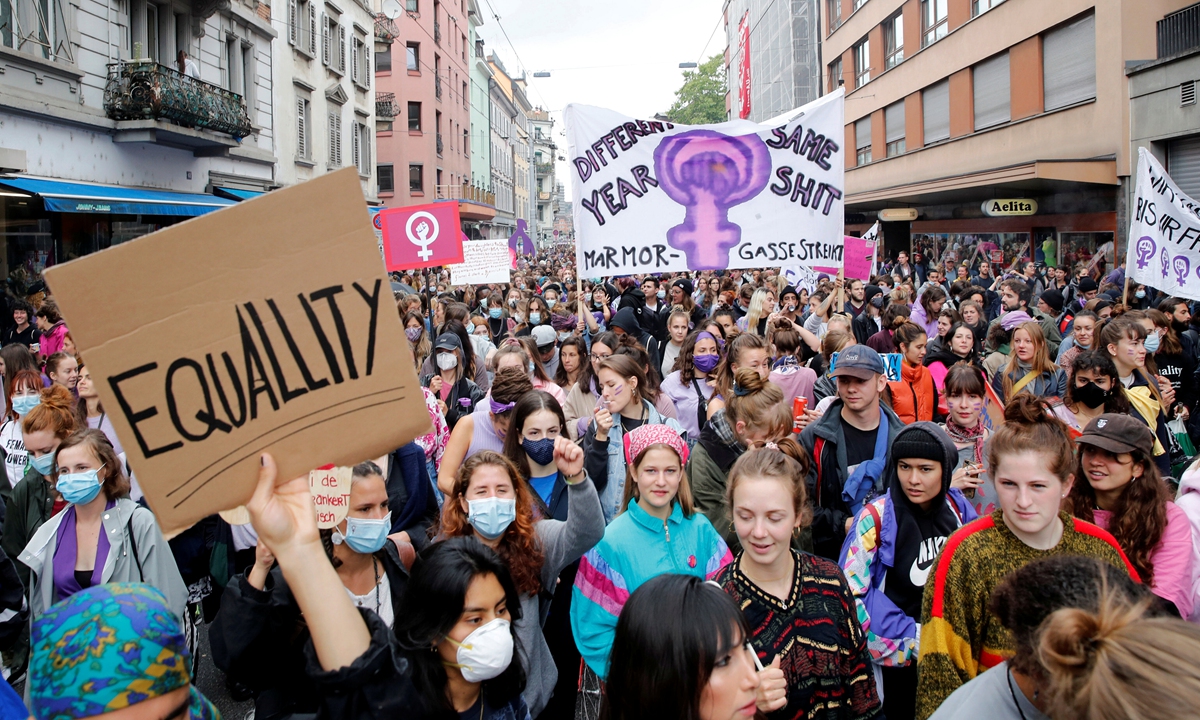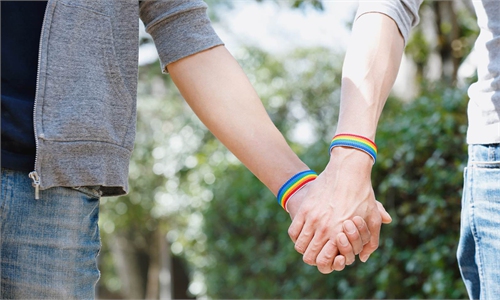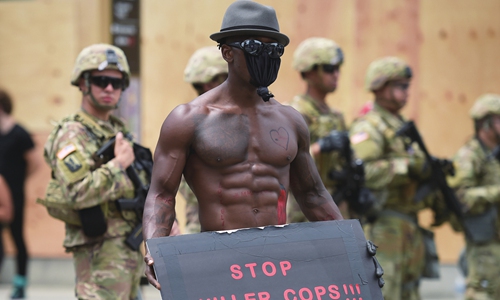Radicalized US 'woke' culture not conducive to vulnerable groups' demands, interests

A group of around 2,000 women staged a different kind of protest in Zurich, Switzerland which involved a mass scream to demand an end to domestic violence and demand gender equality. Photo: VCG
French President Emmanuel Macron recently warned against the dangers of US-style "woke" culture in France in an interview with ELLE, saying that debate in France was becoming increasingly "racialized." He also pointed out that creeping racial and identity politics risked "fracturing" the foundations of the French society.
France's alertness to American "woke" culture is not only reasonable, but also a sign of its self-reflection. For a long time, marginal countries, developing countries and international organizations were the main powers that reflected on the process of Americanization. It is very rare for a country in the European geographic center like France to reflect on the "woke" culture from the perspective of political elites. This shows the rampant invasion of American "woke" culture with its negative consequences being increasingly exposed for threatening the social stability and harmony among different ethnic groups in France.
The advocates of "woke" culture tend to use divisive language and try to force a country to draw a dividing line between different ethnic groups and people, rather than upholding a shared one. Their behaviors not only separate the traditional groups and cultural structures of the West, but also re-create a new separatist identity. As a result, this will pose a great threat to European civilization.
The universal values between European countries and the US are at the heart of the so-called universal values of the West. However, a series of events that have happened in the US prove that the "woke" culture is trying to turn the tables. It wants to replace those core values and put "democracy, freedom, respect for human rights and dignity" on the back seat.
Due to the high homogeneity of Western cultures and politics, the spread of "woke" culture and Leftism has grown more rapidly since the 2020 "Black Lives Matter" (BLM) movement in the US. Similar political systems and social cultures can lead to a higher risk of penetration of social problems in Europe and the US; and some emerging social movements or cultural trends have become more likely to influence each other. Especially in the US, which itself is an immigrant country, most of its ethnic groups originated in Europe. Within these highly similar "salad bowl" structures, the US BLM movement is bound to spread to European countries.
Macron said in the interview that "social difficulties are not only explained by gender and the color of your skin, but also by social inequalities."
Some experts also indicate that it is unrealistic to associate identity recognition with political correctness as a means to solve the difficulties faced by minority groups.
Once issues of identity are bound up with political correctness, it will fall into a trap: It can become a tool of discourse and power simultaneously manipulated by the ruling party and the oppositions. The politicization of identity recognition is like a new type of racism which tries to shape negative and divisive political groups. Their attempt cannot resolve the dilemma confronted by the sexual minorities either. Instead, it is only by systematically solving social problems in Western society that their dilemmas can be solved. Personalizing the issue rather than publicizing it is more conducive to protecting these vulnerable groups.
Recently, WeChat banned dozens of LGBT accounts run by university students. This has attracted attention at home and abroad. This was an important decision made by Tencent, whose managers oppose the accounts' practice of whipping up a public opinion frenzy rather than the LGBT groups' demands or interests.
Although the LGBT group is socially vulnerable, they also have to obey the laws of the land. In a word, what Chinese regulators oppose is the LGBT group in China trying to achieve its goals in a way that echoes the West. The regulators do not want to see Western standards blindly and mechanically applied to China.
China's handling of issues including racial and sexual orientation is generally in line with the overall needs of national administration and social stability and harmony. It is also in accordance with the Chinese people's traditionally introversive character.
Generally speaking, China tends to handle these issues with a low profile rather than hype so as to avoid disturbing social harmony and stability. Although China still faces some shortcomings, it has dealt with these affairs far better than Western societies have. Many Americans would agree with Dr Martin Luther King Jr's view that a person's character is more important than the color of his/her skin. Likewise, most Chinese would probably be more receptive to the idea that regardless of race, gender, and sexual preference, a good character is what matters most.
The author is an associate professor at the School of International Relations, Beijing International Studies University, and a visiting scholar at the University of Iowa.
The article was translated by Ye Zhouying of East China Normal University.


